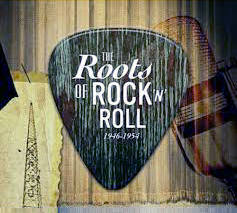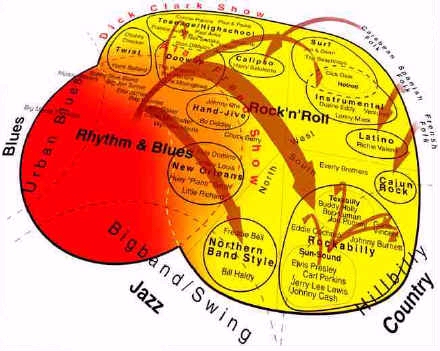Roots Of Rock and Roll

- Blues - The blues form is a cyclic
musical form in which a repeating progression of chords
mirrors the call and response scheme commonly found in
African and African-American music. During the first
decades of the 20th century blues music was not clearly
defined in terms of a particular chord progression
- Country - the music of America's
heartland, can be traced back to British Immigrants who
brought with them a tradition of storytelling Celtic
ballads and string-instrument playing, especially
fiddling. The tradition survived in isolated rural
communities but developed an American accent as music for
square dances and hoe-downs.
- Traditional/Folk - traditional folk
music has been defined in several as music transmitted
orally, music with unknown composers, music that is
played on traditional instruments, music about cultural
or national identity, music that changes between
generations (folk process), music associated with a
people's folklore, or music.
 l
l
- Bluegrass - A subgenere of country
music, bluegrass shed it's formative skin and forged a
separate identity in the mid-Forties when bandleader Bill
Monroe altered the complexion of "hillbilly"
music. Monroe fused country, blues, jazz, gospel, and
Celtic folk into an unified style
.
- Boogie-Woogie - A style of piano playing
that features a "hot" rhythm based on
eight-to-the-bar figures with the left hand. The style is
believed to have originated in Kansas City with pianists
such as Pete Johnson and Joe Turner. The term came from
"booger-rooger" which was an expression for a
"hot" party or musical good time, used by Texas
Twenties country bluesman Blind Lemon Johnson. Through
blues guitarists such as Albert Smith ("Guitar
Boogie") and John Lee Hooker ("Boogie
Chillin") the phrase came to refer to guitar
playing, too.
- Gospel - The term
"gospel music" was probably coined in the
Twenties by Thomas Dorsey, a Georgia blues singer who was
converted and began composing religious songs in popular
styles. Originally denounced, it caught on with the black
sanctified church and has evolved along side black
secular music. Gospel singing is rooted in the ornate
style of the old spirituals and in the impassioned
"testifying" declamation of Baptist preachers.
The close-harmony group vocals of the late forties and
fifties gospel - with the group responding to and urging
on the soaring, improvising lead singer had many links to
the acapella and and doo-wop of the fifties.
- Jazz - A music that depends primarily on
improvisation and reflects a long tradition of changing
ideas of structure, freedom and swing. The first music
known as jazz was the New Orleans style
("Dixieland"), in which a small group would
improvise collectively on a well known tune. in the
Twenties trumpeter Louis Armstrong and others began to
separate the soloists from the accompaniment, each
permitted different degrees of freedom -an idea that
ruled jazz for the next few decades through the harmonic
and rhythmic revolutions of the big bands of the Thirties
swing era, (Duke Ellington, Fletcher Henderson, Benny
Goodman), bee-bop in the late Forties (Charlie Parker,
Dizzy Gillespie) and "cool" and hard bop and
modal playing in the Fifties (Miles Davis, Thelonius
Monk)
What
is Jazz?
Rhythm and Blues - a descriptive
term that has never had a clear single meaning. In it's
broadest sense, R&B denotes black pop music. However,
as black pop music changes, it has become a term
that is often defined by whatever black musical style it
is attached to at a given point in time, rather than
the other way around. In the beginning it was a
renaming of "race" music. and later gave way to
soul, funk, disco and simply "black" styles.
small rhythm and blues combos revved up Tin Pan Alley pop
tunes with rhythms derived from swing jazz and vocals
reflecting the blues. They linked the big band jump blues
of the Forties with early rock and roll. Early rock and
roll hits were often covers by white singers of R&B
hits, like Elvis Presley's version of Roy Brown's
"Good Rockin' Tonight" or Bill Haley and His
Comets cleaned-up take on Big Joe Turner's "Shake,
Rattle and Roll.
Influences courtesy Rolling Stone's "Encyclopedia of Rock
and Roll."



 l
l![]()